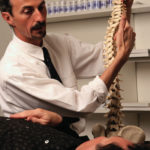
Chiropractic care (also simply “chiropractic”) is a health care discipline that emphasizes the inherent power of the body to heal itself without the use of drugs or surgery. It focuses on the relationship between the body’s structure (primarily the spine) and function (as coordinated by the nervous system) and how that relationship affects the preservation and restoration of health. When appropriate, doctors of chiropractic work in cooperation with the patient’s other health care practitioners.
Chiropractic doctors diagnose and treat patients whose health problems are associated with the body’s muscular, nervous and skeletal systems. Chiropractors believe that interference with these systems can impair normal functioning, cause pain and lower resistance to disease. They are most well known for the hands-on technique they practice to adjust imbalances in the patient’s skeletal system, particularly the spine.
Working Conditions
Chiropractors work in clean, comfortable offices. They spend a great deal of time on their feet and use hands-on manipulation techniques to resolve imbalances in the patient’s skeletal system.
The average work week is 40 hours, although longer hours are not uncommon. Solo practitioners set their own hours but may work evenings or weekends on order to accommodate their patients.
Academic Requirements
Most chiropractic medicine programs require that applicants have at least three years of undergraduate education, and an increasing number require a bachelor’s degree. In either case, your undergraduate studies must include a prescribed number of prerequisite courses, as defined by the field’s accrediting body, the Council on Chiropractic Education.
Accredited chiropractic medicine programs last four years and lead to a Doctor of Chiropractic (D.C.) degree. The standard curriculum covers:
- Anatomy
- Biochemistry
- Physiology
- Microbiology
- Pathology
- Public health
- Physical, clinical and laboratory diagnosis
- Gynecology and obstetrics
- Pediatrics
- Geriatrics
- Dermatology
- Otolaryngology
- Diagnostic imaging procedures
- Psychology
- Nutrition/dietetics
- Biomechanics
- Orthopedics
- Neurology
- First aid and emergency procedures
- Spinal analysis
- Principles and practice of chiropractic
- Clinical decision making
- Adjustive techniques
- Research methods and procedures
- Professional practice ethics
For a list of accredited chiropractic medicine programs, see the Association of Chiropractic Colleges website.
Learn More About a Career as a Chiropractor
- Watch the video profile about chiropractors (in the Health Sciences category).
